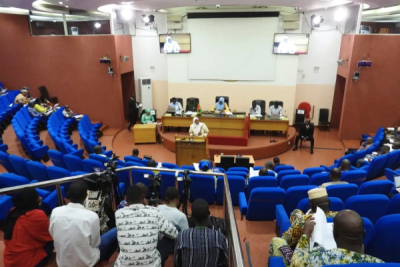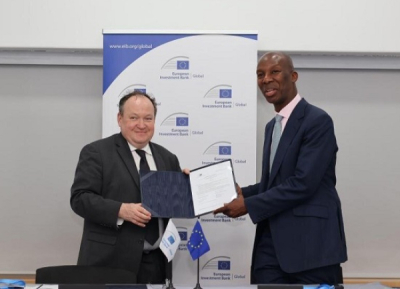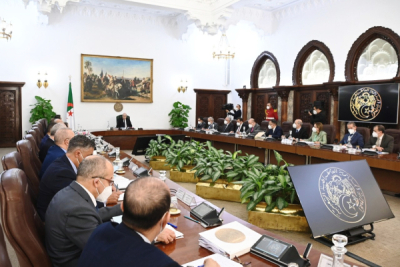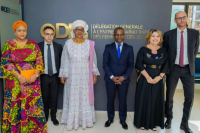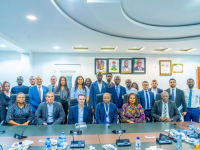Flutterwave, Africa’s payments technology company, has received approval from the Bank of Ghana to provide inward remittance services, it announced on March 11. This furthers its mission to simplify payments across the continent.
With this approval, Flutterwave aims to offer faster, more secure, and cost-effective remittance services for Ghanaians abroad sending money home.
By enhancing cross-border payments, Flutterwave is set to boost financial access and economic growth.
Satellite network operator Intelsat and MaxIQ Space, an educational resource provider, are expanding the Africa Space STEM Program to schools in Kenya, Nigeria, South Africa, and Senegal. The initiative, announced on March 10, will grow to 12 schools, integrating in-person learning to inspire the next generation of African scientists and engineers.
The program offers in-community sessions with space STEM experts, innovative STEM kits, and interactive training, helping students explore space science, sustainability, and IoT technologies.
By equipping students with STEM skills, the program supports national development goals and strengthens Africa’s technological landscape. Application deadline is March 31st.
To fully realize the potential of artificial intelligence, Africa needs to build robust infrastructure. Burkina Faso is actively pursuing this path, aiming to harness AI for national development, particularly in vital sectors like healthcare and education, with a focus on sustainable and independent innovation.
Burkina Faso is positioning artificial intelligence (AI) as a strategic driver of its digital and economic development, the government announced Tuesday. Minister of Digital Transition, Posts, and Electronic Communications, Aminata Zerbo/Sabane, outlined the nation's progress and ongoing initiatives to the Transitional Legislative Assembly (ALT), emphasizing a vision of sovereign AI innovation.
"We are working to maximize AI's benefits while mitigating risks," Zerbo/Sabane stated. "Our goal is to establish Burkina Faso as a hub for independent AI innovation, developing solutions tailored to our unique needs and cultivating a generation of experts capable of competing regionally. Burkina Faso possesses the necessary assets to become a regional AI leader."
To achieve this, the government has established the Permanent Secretariat for Innovation and Monitoring of Emerging Digital Technologies (SPIVTEN), tasked with overseeing and regulating AI development. Infrastructure investments include a national backbone and a G-Cloud, providing secure data hosting and high-performance computing for AI applications.
Burkina Faso is also deploying AI-powered digital solutions to modernize public services. The DJAM platform and regulatory chatbots have been launched to streamline digital access and automate administrative processes. An AI action plan, currently under development, will be integrated into the national digital strategy to guide the technology's expansion.
A major focus on training and capacity building is planned. Through the Digital Transformation Acceleration Project (PACDIGITAL), substantial funding has been allocated to establish AI centers of excellence and offer scholarships for specialized training. A recruitment drive for 100 engineers will commence shortly, offering intensive training in AI and cybersecurity, bolstering local expertise and digital sovereignty.
A PwC study indicates AI could contribute $1.2 trillion to Africa's economy by 2030, boosting GDP by 5.6% through productivity gains in sectors like agriculture, health, finance, and education. Burkina Faso aims to leverage these advancements to become a leading West African AI player, developing localized solutions and fostering a competitive digital ecosystem.
By Samira Njoya,
Editing by Sèna D. B. de Sodji
African startups have faced a decline in funding in recent years, but there is a growing number of initiatives aimed at helping them secure more investment.
Helios Investment Partners, a UK-based private equity firm, has secured backing from the International Finance Corporation (IFC) and the European Investment Bank (EIB) to launch a $750 million fund focused on technological innovation across Africa.
The fund, dubbed Helios V, aims to invest in 10-12 companies, with average investments ranging from $70 million to $80 million, according to the IFC's project information portal.
The EIB has committed $75 million to Helios V, while the IFC has also invested $75 million and earmarked an additional $50 million for direct co-investments in select portfolio companies.
Helios V will primarily target startups in digital infrastructure, including data centers, fiber optic networks, and telecom towers. The fund will also invest in financial technology and technology-enabled business services, such as cloud solutions, digital health, and logistics.
While the fund is expected to bolster Africa's entrepreneurial landscape, its success hinges on the selection of viable companies and their ability to achieve sustainable growth amid economic volatility.
The launch comes as African startups face a decline in funding. In 2024, they raised $2.2 billion in equity, debt, and grants (excluding exits), according to data from Africa: The Big Deal, a database tracking investments above $100,000. This represents a 25% drop from the $2.9 billion raised in 2023.
By Adoni Conrad Quenum,
Editing by Feriol Bewa
To modernize its operations, the Algerian state has focused on rapid digitization. A fully digital tax system is being developed to simplify and enhance the security of tax processes.
Algerian President Abdelmadjid Tebboune has directed the rapid implementation of a project to digitally link national tax data with the country's central digital database, signaling a push to eliminate manual tax data management and enhance transparency.
The directive, issued during a Council of Ministers meeting on Sunday, March 9, underscores the government's commitment to modernizing its tax system, according to a statement released by the council.
"This directive aims to facilitate procedures for investors while ensuring transparency in tax collection, monitoring, and regularization through a fully digitized process," the statement reads.
The digital interconnection seeks to streamline tax procedures for taxpayers, particularly investors, by providing faster access to tax services. It also aims to strengthen transparency and traceability in tax transactions, reducing the risk of fraud, tax evasion, and non-compliance. The digitization is expected to optimize tax revenue collection and improve property valuation.
The project is part of a broader initiative to modernize Algeria's tax administration and digitize public services. Since early 2023, sectors including Customs and State Property have undergone digital transformations.
The tax administration has deployed digital platforms, such as "Djibayatic" and "Moussahamatic," across tax structures nationwide, enabling taxpayers to conduct online procedures, file declarations, and make digital payments.
However, full implementation requires interoperability between tax platforms and those of other government agencies and economic sectors. Nine key interfaces are to be established, including connections with the Ministry of the Interior, Customs, State Property, the National Trade Register Center (CNRC), and the Algerian Investment Promotion Agency (AAPI). These interconnections will refine taxpayer identification and simplify procedures.
The project aims to modernize the tax administration and optimize revenue collection. Success hinges on deploying infrastructure, training tax agents in digital tools, and educating taxpayers on the benefits of digital taxation.
Algeria's move reflects a commitment to building a modern, transparent, and efficient tax administration.
By Samira Njoya,
Editing by Sèna D. B. de Sodji
The Embassy of Finland in New Delhi and UNICEF have launched a global call for applications from tech startups in low- and middle-income countries developing FemTech solutions—innovations designed to enhance the health, wellness, and economic participation of women and girls.
The UNICEF Venture Fund, backed by Finland, will provide grant funding and one year of mentoring to selected early-stage tech startups using Artificial Intelligence (AI), blockchain, and other advanced technologies. Applications are open until May 8, 2025.
The FemTech initiative (2025-2030) will invest in solutions designed with and for women and girls, addressing disparities shaped by gender and social barriers.
Kenya: Communications Authority Takes Action Against TikTok Following Child Exploitation Allegations
Kenya’s crackdown on TikTok’s content moderation failures is a significant step toward safeguarding digital spaces in Africa, with broad implications for the continent’s development.
The Communications Authority of Kenya (CA) has launched an urgent investigation following a BBC report alleging that minors in Kenya were involved in sexualized livestreams on TikTok, with the platform reportedly profiting from digital gifts sent by viewers.
Expressing serious concern, the CA emphasized, in a release dated March 6, that such activities violate both Kenyan and international laws on child protection. Kenya’s existing legal framework—including the Computer Misuse and Cybercrimes Act, the Films and Stage Plays Act, the Children Act, and the Data Protection Act—strictly prohibits online child exploitation. These laws align with global standards such as the United Nations Convention on the Rights of the Child (UNCRC) and the African Charter on the Rights and Welfare of the Child.
In response to the BBC report, the CA has ordered TikTok to remove all explicit content involving minors, explain how it bypassed moderation, and present a plan to strengthen child protection measures. TikTok will also face a formal investigation with potential sanctions for legal violations. Meanwhile, the CA is increasing public awareness by educating parents on online safety and promoting parental control tools.
The CA also reminded TikTok of its previous commitments to improve content moderation and establish a local office in Kenya, following government directives in 2023. The latest revelations suggest that significant gaps remain in TikTok’s enforcement of its policies, necessitating stronger regulatory action.
The CA has urged all online platforms operating in Kenya to comply with the country’s legal and regulatory requirements, particularly regarding the protection of minors and the prevention of harmful content. Parents and guardians are also encouraged to utilize online child protection resources at https://cop.ke-cirt.go.ke/.
The authority reaffirmed its commitment to ensuring a safe, ethical, and secure digital space for all Kenyans and vowed to hold digital platforms accountable for any violations.
Kenya’s decisive response to online child exploitation could set a precedent for stronger social media regulation across Africa, where digital platforms have increasingly become spaces for abuse, including child exploitation, hate speech, defamation, and misinformation.
Online child exploitation is a growing concern in Africa. A 2024 report by ChildFund International and the African Child Policy Forum revealed a significant increase in online child sexual exploitation and abuse across the continent, with over 60% of unidentified victims being young children, including infants and toddlers, and 65% being girls.
Hikmatu Bilali
The role of North-South cooperation is critical in advancing innovation across Africa. Such partnerships enable technology transfer, provide crucial funding, and support entrepreneurial endeavors, thereby stimulating the growth of local startups and improving the continent's competitive standing.
France and Senegal are moving to strengthen their digital sector cooperation, with a focus on supporting young entrepreneurs. French Minister Delegate for Francophonie and International Partnerships, Thani Mohamed-Soilihi, visited Senegal's General Delegation for Rapid Entrepreneurship of Women and Youth (DER/FJ) on Monday, March 10, to review existing partnerships and explore new avenues for collaboration in digital technology and innovation.
The visit aimed to accelerate the growth of Senegalese tech startups and bolster support for young entrepreneurs.
"We are in Senegal to strengthen the partnership between France and Senegal. A win-win partnership, and I am very proud to see here that the French Development Agency (AFD) and other operators, including the African Development Bank (AfDB), are helping to promote these crucial and innovative projects for Senegalese youth. France is committed to establishing this new partnership agenda that respects our historical ties," Mohamed-Soilihi said.
The visit comes amid increased cooperation between the two nations in innovation and entrepreneurship. Through initiatives like Choose Africa 2, France is actively backing young African entrepreneurs. The DER/FJ, in partnership with the AFD and other stakeholders, has facilitated the creation of 74,000 jobs and supported 10,000 entrepreneurial initiatives, including 40 startups in collaboration with HEC Paris.
Projects such as Game Hub Senegal and Anim’Lab provide young talent with training and hands-on experience in digital creation.
The visit also raised the prospect of the AFD signing the second phase of the Innovation Valorization Support Program (PAVI 2), which would enhance young entrepreneurs' access to financing and technical assistance.
These potential partnerships align with Senegal's New Technological Deal, the country’s national digital transformation strategy. The ambitious program aims to certify 500 technology startups and create 150,000 direct jobs by 2034, positioning innovation as a key driver of Senegal’s economic growth and competitiveness.
Moroccan authorities are prioritizing the development of citizens' digital skills. As part of this effort, they signed an agreement in late February to establish a specialized coding school in the Fès-Meknès region.
The Moroccan government will train children in digital skills and artificial intelligence as part of a national strategy to enhance its digital workforce.
An agreement was signed for that purpose on Saturday, March 8, between several stakeholders, under the supervision of Amal El Fallah-Seghrouchni, the Minister Delegate in charge of Digital Transition and Administrative Reform.
The partnership also includes the Ministry of Youth, Culture and Communication, the Ministry of Economy and Finance, and Mohammed VI Polytechnic University.
"This national program aims to introduce children to digital technologies and artificial intelligence through training workshops while instilling in them a responsible and secure use of digital tools," the ministry said in a press release published on social media. "Adopting an inclusive approach, this initiative seeks to support young digital talents across the Kingdom to integrate them into the country's digital transformation dynamic."
The initiative aligns with Morocco's ambition to "develop a pool of high-quality digital talent," as outlined in the Digital Morocco 2030 strategy. The Kingdom also aims to move up the value chain and strengthen its position in the outsourcing and digital export sectors.
In late February, an agreement was signed to establish a specialized school for programming and coding in the Fès-Meknès region.
The program could prepare Moroccan children for a rapidly evolving job market driven by accelerated digital transformation. According to the World Bank estimates, by 2030, nearly 230 million jobs in Sub-Saharan Africa will require digital skills. While Morocco is not part of Sub-Saharan Africa, the projection underscores the strategic importance of digital skills training in supporting the digital transition of African countries.
By Isaac K. Kassouwi,
Editing by Sèna D. B. de Sodji
As Nigeria continues its digital transformation, ensuring secure cross-border data exchanges is essential. With cyber threats on the rise, international cooperation helps bolster Nigeria’s cybersecurity framework, protecting businesses and citizens.
The Nigeria Data Protection Commission (NDPC) announced on March 6 that it received a delegation from the UK Department for Business and Trade (UK DBT) as part of the UK/Nigeria Inward Cybersecurity Trade Mission. The delegation, led by UK DBT Country Director Mark Smithson and Deputy Country Director Morayo Adekunle, engaged in discussions on strengthening cybersecurity cooperation between both nations.
Representing NDPC’s National Commissioner and CEO, Dr. Vincent Olatunji, the Commission’s Head of Legal, Enforcement, and Regulations, Babatunde Bamigboye, received the UK team. Dr. Olatunji, who joined virtually, highlighted NDPC’s achievements since its inception, emphasizing that cooperation and collaboration remain core strategic pillars of the Commission.
He underscored the importance of secure cross-border data exchange in the digital economy, noting that Nigeria’s data protection ecosystem is rapidly growing. He also revealed that NDPC generated approximately $1 million in revenue for the Federal Government last year.
Discussions covered enforcement mechanisms, human capital development, artificial intelligence challenges, and sustainable compliance strategies. Further engagements between NDPC and UK DBT are expected, laying the groundwork for enhanced cybersecurity partnerships and regulatory cooperation between Nigeria and the UK.
The data security market in Nigeria is expected to reach $4.11 million by 2025, with an annual growth rate of 9.70% leading to a market volume of $5.95 million by 2029, according to Statista. With data security becoming a top priority, international partnerships—like the UK-Nigeria cybersecurity collaboration—will play a vital role in knowledge-sharing and technology transfer. This can boost Nigeria’s credibility in global digital trade, making it easier for Nigerian companies to do business internationally.
Hikmatu Bilali
More...
In January 2025, the fintech secured $53 million in a Series B funding round, led by Highland Europe, bringing its total funding to $85 million. The company plans to use these funds to establish itself as the primary financial services platform for immigrants.
LemFi is a fintech solution developed by a Nigerian startup, enabling diaspora communities in Europe and North America to transfer funds from African countries. Founded in 2021 by Ridwan Olalere and Rian Cochran as Lemonade Finance, the company rebranded as LemFi in 2023.
In January, the Nigerian fintech raised $53 million to develop its products, strengthen its global presence as a financial services hub for immigrants, and support its growth. "This new funding will support us in our mission to build the financial services hub for immigrants globally from adding new features to expanding to new countries," said Ridwan Olalere.
The solution features a mobile application available on iOS and Android, where it has been downloaded more than a million times, according to Play Store data. Users create an account to access LemFi’s services. In addition to international money transfers, the fintech offers the creation of international accounts, requests for money from relatives, and the generation of payment links.
Transfers via LemFi can be made directly to bank accounts, mobile wallets, or other available options. Transaction fees are nonexistent for certain destinations and relatively low for others. The Nigerian startup is backed by various entities, including the California-based accelerator Y Combinator, which selected it for its Summer 2021 cohort.
By Adoni Conrad Quenum,
Editing by Feriol Bewa
The work on the Chadian component of the Trans-Saharan Fiber Optic Backbone was launched in May 2023. The project, assigned to the CGPS/LORYNE consortium, was initially scheduled to last ten months.
The Chadian government is urging the companies involved to speed up work on the Chadian component of the DTS project while ensuring that the quality of the installations is not compromised. According to authorities, the infrastructure is significantly behind schedule, with only 32% of the work completed.
Boukar Michel, Minister of Telecommunications, assessed the progress of the project on Thursday, March 6, during a field visit. He was accompanied by his colleagues and officials from entities under his ministry's supervision, including the Agency for ICT Development (ADETIC) and the Regulatory Authority for Electronic Communications and Postal Services (ARCEP).
This call comes after an intervention by Boukar Michel in May 2024, when he expressed concern over the slow progress and announced that a “drastic decision” would be taken. During another visit in October, the minister, accompanied by representatives from the European Union (EU) and the African Development Bank (AfDB), acknowledged some progress, albeit moderate, while stating that the work would be completed by the end of 2024 or early 2025.
The Chadian component of the DTS is a key element of Chad’s digital connectivity strategy. Lacking direct access to the sea and submarine cables, the country relies on its neighbors, particularly Cameroon and Sudan, for its connection to the international Internet. This infrastructure is also expected to facilitate interconnection with countries such as Niger, Mali, Nigeria, Mauritania, and Algeria. Official discussions with Egypt were also initiated in December 2024, paving the way for further collaborations.
"For dynamic electronic communication, a highway is needed for digital data traffic, and today, the most suitable highway is fiber optics. This is why the government, with the support of its partners, is committed to developing information and communication technologies (ICTs),” the Ministry of Telecommunications stated in a press release published on its Facebook page.
By Isaac K. Kassouwi,
Editing by Sèna D. B. de Sodji
Securing identity authentication is a critical challenge across online transactions, public services, and data protection. Given the swift evolution of fraud techniques, enhanced by technological progress, African nations are compelled to reinforce their systems without delay.
Generative artificial intelligence (AI), a rapidly growing technology, is revolutionizing numerous sectors. However, in Africa, as elsewhere, it is also being exploited for malicious purposes. Fraudsters are using these tools to create fake documents, synthetic voices, and hyper-realistic images, facilitating sophisticated scams and financial crimes. This new wave of AI-driven fraud presents major challenges in security and identity verification, according to Smile ID's report, "2025 Digital Identity: Fraud in Africa Report – Trends, Tactics, and Key Solutions to Tackle Fraud Effectively."
Biometric Fraud Explosion
One of the most concerning aspects of this trend is the increase in biometric fraud attacks. With the availability of free or low-cost AI tools, fraudsters can now produce deepfakes (fake videos or audio recordings) and high-quality fake selfies. According to recent data, deepfake-related incidents increased sevenfold between the second and fourth quarters of last year. Selfie anomalies, used to bypass verification systems, now account for 34% of emerging biometric fraud cases.
These techniques allow criminals to create fake identities or manipulate existing biometric data, making traditional security systems increasingly vulnerable. West Africa recorded the highest rise in biometric fraud cases in 2024. Cases of identity theft have increased in the region, representing 15% of biometric fraud cases, compared to less than 5% in 2023.
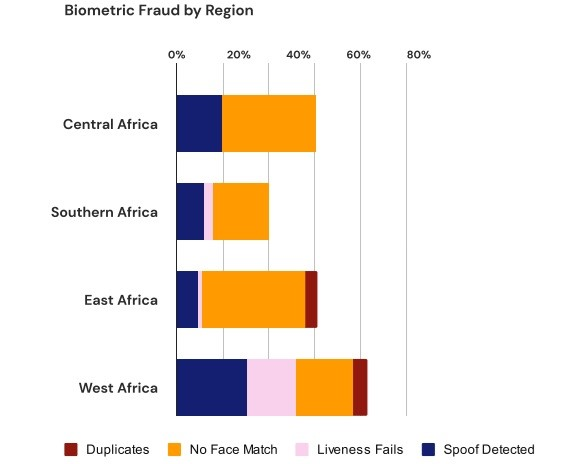
Traditional Verification Methods Under Threat
Faced with these technological advances, traditional identity verification methods seem increasingly outdated. Generative AI allows fraudsters to imitate individuals in real-time with unsettling realism. Security systems based on facial recognition or document verification are now vulnerable to high-quality falsifications.
Experts point out that the easy access to generative AI tools has paved the way for an industrialization of fraud. Criminals can mass-produce fake documents, photos, and videos, exposing major flaws in current protection systems. Among the most striking examples of this new era of fraud is OnlyFake, an underground platform that uses advanced neural networks to produce impressively high-quality fake identity documents. For just $15 per document, users can generate convincing documents capable of deceiving digital verification systems. OnlyFake perfectly illustrates how generative AI has eliminated the technical barriers once exclusive to expert counterfeiters.
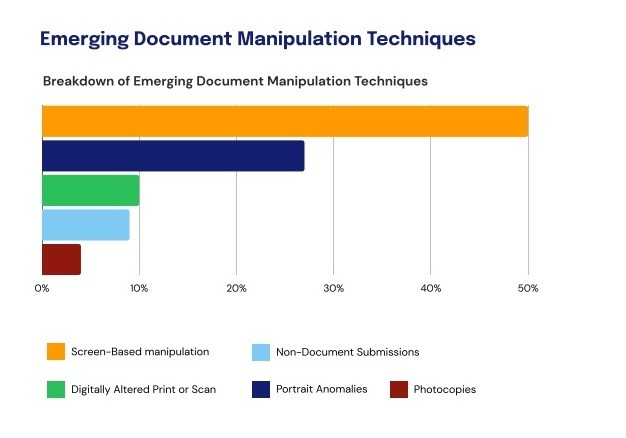
Beyond the use of AI, which is growing in biometric fraud, Smile ID indicates that other techniques are also being implemented, notably document fraud and identity farming.
Document fraud involves manipulating or falsifying identity documents. This includes counterfeiting, altering genuine documents, and obscuring essential information. Emerging techniques include on-screen document manipulation, portrait anomalies, and the submission of altered photocopies or scanned documents.
As for identity farming, it involves collecting large amounts of personal information, often through illegal means, to facilitate fraud. This data is used to create synthetic identities, take control of existing accounts, or open fraudulent accounts.
Increasing Financial Losses
The growing use of identity fraud techniques in Africa has had significant consequences. Despite improvements in Know Your Customer (KYC) processes, financial losses due to fraud have increased in major markets. In Nigeria, banks reported losses of 42.6 billion naira ($28.2 million) due to fraud in the second quarter of 2024 alone, surpassing the total losses of 9.4 billion naira for the entire year 2023. Similar trends have been observed in South Africa, Ghana, Zambia, and other key African markets.
East Africa recorded the highest rate of reported biometric and document fraud attempts in Africa, at 27% in 2024. According to Smile ID, this phenomenon is mainly due to outdated, inconsistent, and low-quality identity documents in countries such as Zambia, Rwanda, and Sudan, which continue to hinder verification processes. West Africa saw a significant increase in its rate from 12% in 2023 to 22% in 2024, due to the rise in biometric fraud attempts. Central and Southern Africa recorded respective rates of 22% and 21%.
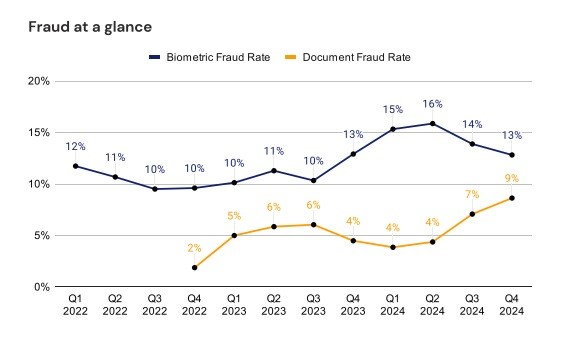
Digital banks recorded a peak in fraud attempts, accounting for 35% of all biometric and document verifications in 2024, followed by microfinance at 30%. These institutions remain prime targets for sophisticated schemes combining identity fraud, account takeovers, and money laundering.
National identity cards recorded the highest fraud rate in Africa in 2024, at 27%, reflecting their widespread use as the main form of identification. Driver’s licenses followed at 24%, due to their frequent use in both formal and informal contexts, increasing their exposure to misuse. Passports had a fraud rate of 20%.
Race Against Time
To address this threat, governments, financial institutions, and technology companies must step up their efforts. Innovative solutions, such as integrating AI to detect deepfakes or strengthening biometric verification systems, are already being explored. However, the speed at which fraudsters adapt their techniques makes this race against time particularly complex.
In Africa, where digital security systems are still developing in many countries, the impact of these frauds could be devastating. International collaboration and increased investment in detection technologies will be essential to counter this growing threat, Smile ID emphasizes. Generative AI, while promising in many areas, thus presents a dual challenge for the continent: harnessing its potential while protecting against its malicious uses.
Africa's mobile internet market is rapidly expanding, fueled by rapid digital growth, a young and connected population, and substantial investments in telecommunications infrastructure.
Sub-Saharan Africa's monthly mobile data traffic per connection is projected to nearly quadruple by 2030, increasing by almost six gigabytes (GB), according to the GSMA. This growth will be driven by the expansion of high-speed mobile network coverage and rising demand for data-intensive content, such as gaming and video streaming.
The Economic Community of Central African States (ECCAS) will see particularly strong growth, with monthly mobile data traffic expected to increase sixfold. Countries like Angola, Chad, and Equatorial Guinea could see a tenfold increase. However, mobile data consumption in the region is projected to remain below the Sub-Saharan African average of eight GB due to lower 4G and 5G penetration rates.
The Economic Community of West African States (ECOWAS) is expected to have the highest mobile data traffic in Sub-Saharan Africa by 2030, reaching 10.1 GB.
The GSMA also indicates that the growth of mobile data traffic in Sub-Saharan Africa will be fueled by greater smartphone adoption. It estimates smartphone adoption rate will rise from 51% in 2023 to 81% in 2030. ECOWAS is expected to be the most dynamic region due to its swift implementation of necessary actions to develop the telecom sector. Its smartphone adoption rate, which stood at 54% in 2023, is projected to reach 83% by 2030.
By then, the five largest smartphone markets in Sub-Saharan Africa are expected to be Nigeria (230 million connections), South Africa (140 million), Ethiopia (97 million), Tanzania (92 million), and Kenya (72 million).
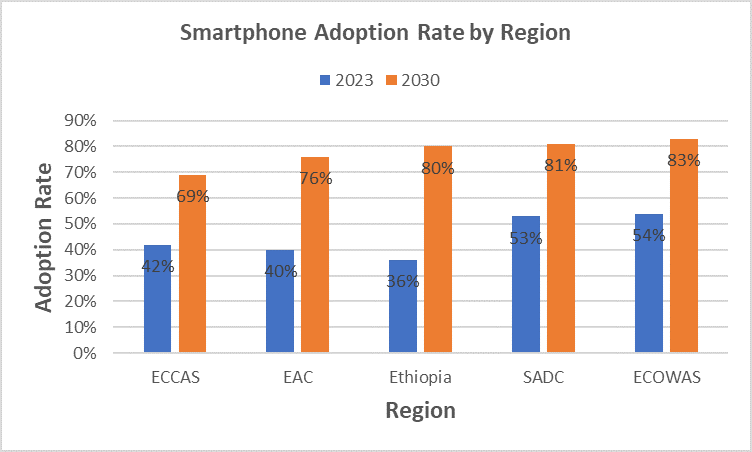
The number of mobile phone service consumers will also be highest in the ECOWAS region.
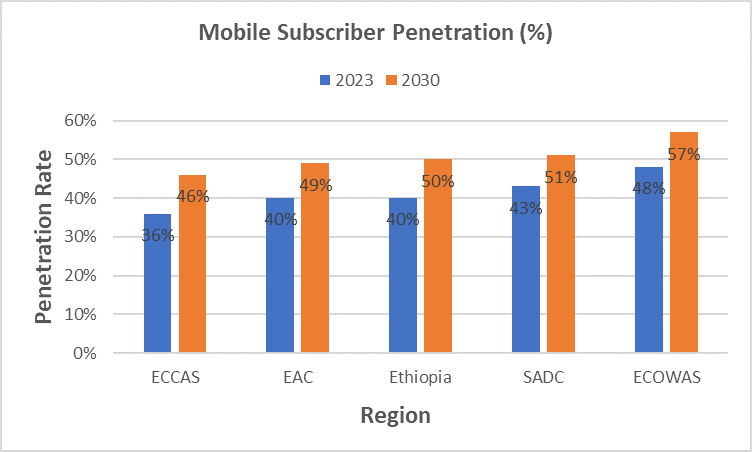
“By 2030, the economic contribution of mobile telecommunications in Sub-Saharan Africa will reach $170 billion. This growth will primarily stem from the continued expansion of the mobile ecosystem and its spillover effects on other sectors, as they increasingly benefit from the productivity and efficiency gains driven by mobile service adoption,” the GSMA stated. In 2023, the mobile industry contributed $140 billion to Sub-Saharan Africa’s economy.
However, for all of GSMA’s projections to materialize, Sub-Saharan African governments must take the necessary measures to encourage telecom operators to invest in networks. Otherwise, mobile network investment is expected to decline after 2027, despite relatively increasing revenues.
Special attention must also be given to smartphone affordability to promote its adoption and facilitate internet access for populations. GSMA recommends eliminating sector-specific excise duties on mobile telecommunications services, including customs duties on mobile phones, reducing VAT rates, and scrapping fixed consumer taxes (such as activation or numbering taxes) that make these services less affordable.
Muriel Edjo




